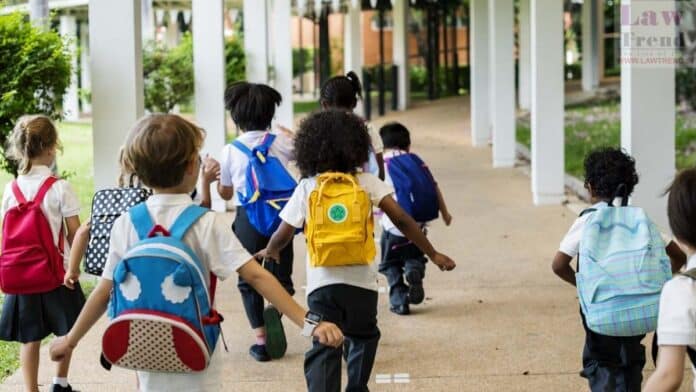Parents who force children below the age of three years to attend preschool are committing an “illegal act,” the Gujarat High Court said, while dismissing a batch of pleas challenging the state government’s decision to set six years as the minimum age limit for Class 1 admission in the academic year 2023-24.
A group of parents of children who did not complete six years as on June 1, 2023 sought to challenge the state government’s notification dated January 31, 2020 prescribing the age limit for admission to Class 1 in the academic year 2023-24.
“Forcing children to go to a preschool below the age of 3 years is an illegal act on the part of the parents who are petitioners before us,” the division bench of Chief Justice Sunita Agarwal and Justice N V Anjaria observed in a recent order.
The petitioners “cannot seek any leniency as they are guilty of violation of the mandate of the Right to Education Rules, 2012 of the Right to Education Act, 2009”, it said.
Quoting Rule 8 of the RTE Rules, 2012, which deals with admission procedure in a preschool, the court said no preschool shall admit a child who has not completed three years of age as on June 1 of the year.
“A bare perusal of Rule 8 shows that there is a prohibition for admission of a child in a preschool who has not completed three years of age as on June 1 of the academic year. Three years of ‘early childhood care and education’ in a preschool prepares a child to take admission in 1st standard in a formal school,” it said.
The children whose parents moved the plea were admitted to a preschool before they completed three years the minimum age prescribed for admission in a preschool in the RTE Rules, 2012, which has been enforced in Gujarat with effect from February 18, 2012, it said.
The petitioners’ counsels told the court that they seek to challenge fixing June 1 as a cut-off date of the current academic year, only because this will deprive around nine lakh children in the state of their right to education in the current academic session.
They sought the court’s direction to accommodate children who completed three years in preschool but have not completed six years of age as on June 1, 2023 for the current academic year by granting them relaxation.
They argued that denial of admission would result in infringement of their right to education recognised by Article 21 A of the Constitution and Right to Education Act, 2009.
The court said that the contention of the parents that their children are school-ready as they have completed three years of elementary education in a preschool, as they were admitted there in the academic session 2020-21, does not impress it.
It said that as per section 2(c) of the RTE Act, 2009, a child of the age of six years is eligible for admission in a neighbourhood school to exercise his or her right to free and compulsory education till the completion of his/her elementary education.
Also Read
“The right conferred upon a child by the constitutional provision of Article 21A and Section 3 of the RTE Act, 2009 begins after completion of the age of six years,” the court stated.
A conjoint reading of sections 2(c), 3, 4, 14, and 15 of the RTE Act, 2009 makes it clear that a child above the age of six cannot be denied education in a formal school, it said.
The National Education Policy, 2020 has recognised children under six years of age require ‘early childhood care and education’, it said.
As per the NEP, 2020, more than 85 percent of a child’s cumulative brain development occurs prior to the age of six, indicating the critical importance of appropriate care and stimulation of the brain in the early years to ensure healthy brain development and growth, the court observed in its order.




